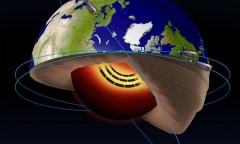By Karla Mae Domingo, | January 31, 2017

Researchers have found out that quartz reacts to create water deep within the Earth's core.
Earth has a lot of water; 70 percent of the planet is water to be precise, and life depends on its existence.
"This is one way water can form on Earth," physicist John Tse from the University of Saskatchewan in Canada told New Scientist. "We show it's possible to have water forming in Earth's natural environment, rather than being of extraterrestrial origin."
Like Us on Facebook
The water discovered in the Earth's mantle may be under so much pressure that it can trigger earthquakes hundreds of kilometres below the planet's surface and tremors whose origins are still unexplained.
At about 1400 °C and pressures 20,000 times higher than atmospheric pressure as silica, or silicon dioxide, quartz reacts with liquid hydrogen to form liquid water and silicon hydride.
Quartz is very stable, but in the upper mantle - which extends from Earth's crust down to a depth of about 410 km (250 miles) - enough heat and pressure can wheedle the material to react chemically.
The simulations indicate that once you start venturing deep enough into the upper mantle to reach a temperature of 1,400 degrees Celsius (2,552 degrees Fahrenheit) and a pressure 20,000 times greater than atmospheric pressure, quartz will begin to react with liquid hydrogen to produce silicon hydride and liquid water.
"However, further research is needed to quantify the amount of released water needed to trigger deep earthquakes," Tse said.
Other researchers have indicated the plausibility that water causes deep quakes.
"These results provide important insights into the reactions between quartz and hydrogen at high pressures," said John Ludden, executive director of the British Geological Survey. "The formation and release of overpressured water may be a significant trigger in the deep lithosphere for ultra-deep earthquakes, sometimes located well below the crust and in the more rigid parts of deep continental plates."
However, these researchers still claim that their findings "have implications for fundamental geoscience questions [on] the origin of water on Earth," until we know more about the volume of water these quartz reactions produce, it may well be a very small amount, Ludden explained.
So, at the moment, the ice comets hypothesis remains the most reliable explanation for life on Planet Earth - until future findings can provide us with a better answer to this mystery.
"I think it's reasonable to assume that much of the water came in this way," Ludden said.
The findings of the study were published in the journal Earth and Planetary Science Letters.
-
Use of Coronavirus Pandemic Drones Raises Privacy Concerns: Drones Spread Fear, Local Officials Say

-
Coronavirus Hampers The Delivery Of Lockheed Martin F-35 Stealth Fighters For 2020

-
Instagram Speeds Up Plans to Add Account Memorialization Feature Due to COVID-19 Deaths

-
NASA: Perseverance Plans to Bring 'Mars Rock' to Earth in 2031

-
600 Dead And 3,000 In The Hospital as Iranians Believed Drinking High-Concentrations of Alcohol Can Cure The Coronavirus

-
600 Dead And 3,000 In The Hospital as Iranians Believed Drinking High-Concentrations of Alcohol Can Cure The Coronavirus

-
COVID-19: Doctors, Nurses Use Virtual Reality to Learn New Skills in Treating Coronavirus Patients








